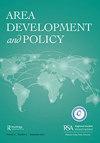The political economy of a North–South trade agreement and the development prospects for Mexico: from NAFTA to USMCA
IF 1.8
Q3 DEVELOPMENT STUDIES
引用次数: 0
Abstract
ABSTRACT In the 1980s, Mexico switched from a policy of import substitution to export-oriented development. From 1994, it participated in a North–South free trade agreement with the United States and Canada (North American Free Trade Agreement – NAFTA). The agreement strongly reflected the asymmetric power of the three participants, although some Mexico’s regions served as production platforms in global value chains. Under NAFTA, Mexico’s overall growth was insipid, yet a trade surplus with the United States was the excuse for Donald Trump’s government to impose a renegotiation that led in 2020 to a new agreement (US, Mexico, Canada Agreement – USMCA) with terms yet more favourable to the United States. In the light of this experience and the political and economic factors that explain it, this paper studies to the need to get Mexico’s trade policies right through permanent consideration to the development needs in the country.南北贸易协定的政治经济与墨西哥的发展前景:从北美自由贸易协定到美墨加协定
摘要20世纪80年代,墨西哥从进口替代政策转向出口导向型发展。从1994年起,它参与了与美国和加拿大的南北自由贸易协定(北美自由贸易协定)。该协议强烈反映了三个参与者的不对称权力,尽管墨西哥的一些地区是全球价值链中的生产平台。在北美自由贸易协定下,墨西哥的总体增长平平,但对美国的贸易顺差是唐纳德·特朗普政府实施重新谈判的借口,该谈判导致2020年达成了一项新协议(《美国、墨西哥、加拿大协议》——USMCA),其条款对美国更有利。根据这一经验以及解释这一经验的政治和经济因素,本文研究了通过长期考虑墨西哥的发展需求来正确制定墨西哥贸易政策的必要性。
本文章由计算机程序翻译,如有差异,请以英文原文为准。
求助全文
约1分钟内获得全文
求助全文

 求助内容:
求助内容: 应助结果提醒方式:
应助结果提醒方式:


